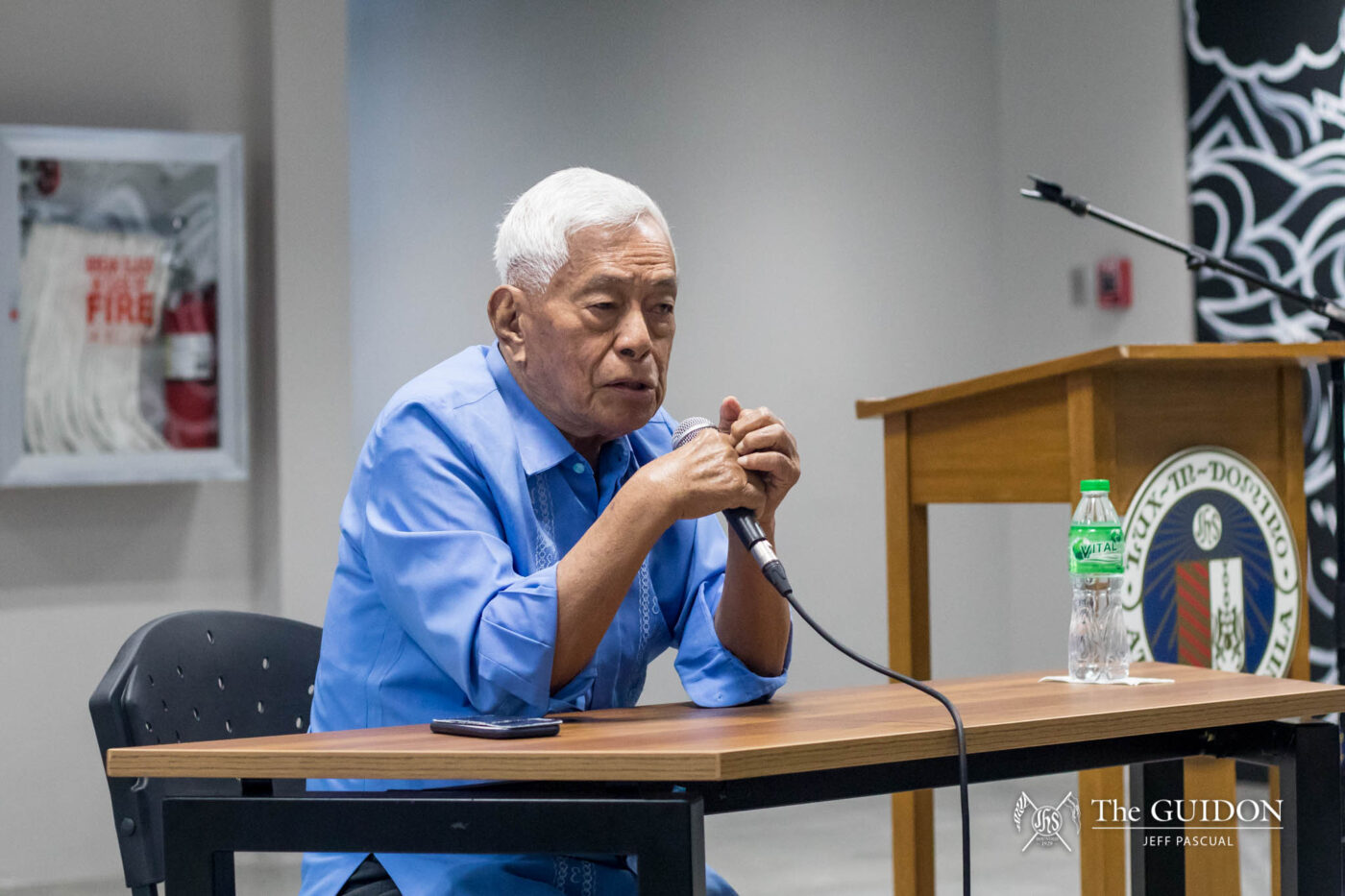FORMER SENATE President Aquilino “Nene” Pimentel Jr. of the Partido Demokratiko Pilipino-Lakas ng Bayan (PDP-Laban) led a town hall discussion on federalism at the Aboitiz Sandbox Room of the Areté last October 24.
Pimentel highlighted the need for a shift in style of government from the present “highly-centralized” system of governance to a federal mode of government because the current system “hampers the speedy development of the nation.”
The former senator’s proposal is among several that politicians have put forward on the issue. On August 22, two representatives filed a resolution calling both houses of Congress to convene as a Constituent Assembly to revise the Constitution. They also attached their proposed draft of the Federal Constitution of the Philippines.
Rationale for federalism
Among the reasons Pimentel indicated as to why a Federal Republic system of government would serve the country better was the “slow delivery” of justice and the oversaturated amount of resources granted to the national government under the current style of governance.
The former senator also recounted anecdotes of his encounters with rebel leaders such as Nur Misuari of the Moro National Liberation Front. According to Pimentel, Misuari advised the government to “adopt Federal Government to achieve peace in this land.”
Under Pimentel’s federalism proposal, the country would comprise of 12 federal states (including Metro Manila as federal capital) operating under one central government. One change that can be expected with this shift in governance is the increase of the number of senators. Pimentel also proposed the senators that will represent overseas Filipinos.
Similarly, the offices of the major branches of the government will be distributed across the major islands of the country. Included in this plan is the relocation of the Federal Legislative offices to Central Visayas, and the Federal Supreme Court in Northern Mindanao. The Federal Executive branch will remain in Metro Manila.
According to the proposal, all income of the government will be distributed as opposed to just the income of the Bureau of Internal Revenue. The allocation of the funds will likewise change, from 60% for the National Government to 20% for the Federal Government, and from 40% to the Local Governments to 80% for all Federal States.
Pimentel likewise proposed an equalization fund that will be represented by all states. According to the former senator, this is to recognize the face that “not all states are equal in terms of income and industry opportunity.”
Pimentel stated that these changes brought about by the shift to federalism will allow local governments to enact true change in their governed areas.
Concerns voiced on shift of governance
During the question and answer portion of the forum, concerned members of the university raised questions regarding the shift from our current style of government to a federal one.
A student of the Ateneo Senior High School asked Pimentel about the possibility of the federal states seceding from the republic. Secession, in the political sense, is the action of a state formally withdrawing from membership of a federation for the purpose of becoming independent.
“Under current laws, secession is illegal. I don’t see why that would change with the shift to a federal government,” said Pimentel.
One Loyola Schools (LS) student asked the senator how much the cost would be for the shifting from a centralized style of government to a federal one.
Pimentel stated, “there is money to do so, it shouldn’t be a major concern of ours. The main task comes from allocating the funds of the government for the purpose at hand.”
Another LS student asked Pimentel if the shift will take place during the time of the current administration.
“For the first time, we have a president that included the shift to federalism as part of his platform,” Pimentel said “and so the interest in it has risen since his campaign and during his presidency. But as for if it will take place during his administration, I do not know.”
Pimentel noted, however, that he was not able to talk to President Duterte yet on his proposal.
An LS student followed up the query by asking Pimentel whether the Duterte administration might possibly take advantage of the shift to perpetuate themselves.
Pimentel replied by noting that the president “plans to resign as soon as the shift to federalism will be completed.”
“I do not believe this is a good decision, however,” Pimentel said. “The president must finish his term to grant assurance to the people that it was the right decision to make.”
‘Remain firm’
Other than Pimentel’s calls for the youth to get engaged in conversations regarding national concerns, he advised the youth of today to continue the fight for Sabah, the Kalayaan Islands, Scarborough Shoal and Benham Rise to fall under Philippine jurisdiction.
“Remain firm, assert our ownership of what is truly ours. While your minds are still sharp and you can still defend what is ours, remain firm.”
Pimentel also encouraged the people to actively participate in the discussions regarding federalism and be on the watch for possible abuses that may arise from the transition.







